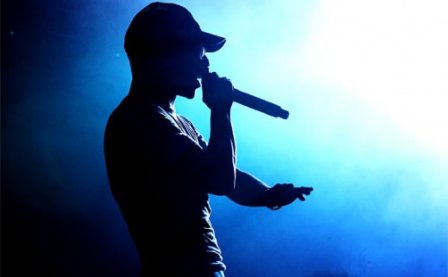Sometimes I fantasize about becoming a truck driver. Yeah, I’m probably wrong to romanticize the job. I’m sure that it can be tiring, stressful, thankless. But part of me just can’t shake the notion that looking out the window of my truck’s cab while speeding through the vastness of this country — the sprawling hills, valleys, and plains; the massive metropolises and tiny towns; the thick forests and expansive deserts — would be an intensely rewarding, deeply affecting, and utterly American experience.
I wasn’t really surprised to learn that Daughn Gibson was once a trucker; the Pennsylvania-bred singer and producer’s music frequently taps into the sort of yearning for the open road that informs my own longings. Most of the songs on All Hell, Gibson’s debut album from just last year, saw the producer sampling dusty, country-tinged instrumentals to create hypnotic loops that served as accompaniment for his deep, commanding croon; in both their connotative quality (country music is, first and foremost, a wholly American form of popular song) and their propulsive repetition, then, the dynamic loops and fragments that formed the backbone for much of All Hell conveyed a distinctly American range of images — a tumbleweed rolling in the wind, the asphalt of the open road disappearing from view under the front hood of your speeding truck.
Which is all to say: Gibson was beginning to outline an intrinsically American aesthetic built from tools both modern and traditional — samplers, synthesizers, and drum machines comfortably coexisted alongside piano, guitar, and voice. At its most surface-level, All Hell seemed to merely be a conflation of two vastly different timbral worlds; at its most vital, however, the album felt like an introduction to an idea with enormous potential, a prelude to a more focused conceptual and aesthetic statement. Which brings us to Gibson’s second album, Me Moan — a record that is decidedly not the type of statement that I felt (or hoped) All Hell was building toward.
From the outset, it’s clear that this most recent record was assembled from a very different set of tools than its predecessor; while All Hell sounded like it could be the work of one man sitting alone with a laptop in his bedroom (or, in Gibson’s case, in a dark corner of the local saloon), Me Moan is far more fleshed out, featuring additional instrumentation and a plethora of flashy production flourishes. This upgrade in the Gibson aesthetic is immediately manifested in album opener “The Sound of Law,” which begins with a fierce guitar riff and a minimal percussive stomp before effectively expanding to reveal dramatic piano chords, atmospheric strings, breathy background vocals, and an incessant snare roll that underpins the entire affair. These elements come together so effectively that when Gibson sings “I was born along the highway side,” it doesn’t come across as a laughable attempt at self-mythologization, but rather as a haunting invocation of the spirit of the American West.
Unfortunately, Gibson soon begins to wander astray in the very dust storm that he has just conjured. While the opening stretch of the record is mostly rather strong — Gibson manages to make the inclusion of bagpipes seem utterly logical on “Mad Ocean” — problems soon begin to arise. Most of the music here is at least vaguely rooted in Gibson’s electro-country explorations of yore, but the majority of the record’s experimental or electronic ideas are treated ornamentally, relegated to merely lurking in the margins. In effect, this means that Gibson’s songwriting is more straightforwardly “country” this time around, and that most of the electronic elements — such as that addictive loop of pitch-shifted vocals that begins “You Don’t Fade” — come across as somewhat gimmicky, like afterthoughts thrown into the mix to, at least superficially, give these songs that trademark Daughn Gibson sound.
And Me Moan’s confusion of purpose certainly isn’t helped by Gibson’s vocal timbre and delivery. In the right circumstances — such as on “Franco,” the album’s comparatively stripped-down and emotionally laid-bare centerpiece — it’s a majestic, powerful tool that allows even the kitschiest of lines (see: that aforementioned lyric from “The Sound of Law”) to acquire some deeper resonance. But on much of this record, Gibson’s delivery seems comical, cartoonish. Take “Kissin’ on the Blacktop,” a song that pairs electronic percussion glitches with slide guitar, emphatic soloing, and a painfully stereotypical “country” narrative; these components are already hardly compelling on their own, but with the addition of Gibson’s affected backwoods croon, the whole thing comes across as some sort of bizarre joke that the listener isn’t in on.
The connection between country music and electronic was always rather tenuous and abstract, but I truly believe that something fascinating and worthwhile can exist at the juncture of these two genres. Unfortunately, Me Moan doesn’t really deepen Gibson’s exploration of this novel niche. Instead, it feels mostly like a country record that still has one foot in the sample-based electronic aesthetic that previously defined Gibson’s work. Ultimately, this is an album that will likely disappoint those (such as myself) who were hoping for a meaningful development of the unique ideas that informed All Hell. And while there are certainly a few successful songs on Me Moan, I can’t really imagine the album being embraced by true country die-hards, either. In the end, this record seems to exist without a home. And it’s unlikely I’ll be playing it on the road when I finally land a job as a trucker.
More about: Daughn Gibson




